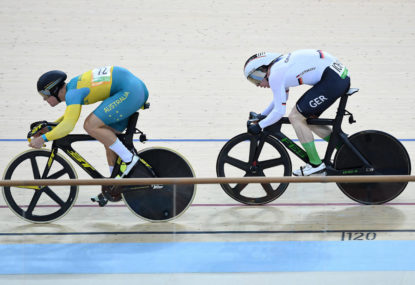'I've just won a stage of the Tour de France, mate!': Hindley grabs yellow jersey as Aussie blows Tour apart
Australia's Jai Hindley has said he is "lost for words" after a shock stage victory at the Tour de France earned him the leader's…

The Australian Cycling Team’s performance at the recent World Track Championships in Hong Kong resembled the old days where Australia was feared and seen as a genuine threat to other countries’ chances of standing on the top spot of the dais.
After the five days of competition, Australia topped the medal count with 11 medals (three gold, five silver and three bronze). The nearest competitor was France with five. Australia smashed the competition like they did in Melbourne in 2012 when they topped the medal tally with 15.
What was even more surprising about the performance of the Australian team was the immediate rebound from a disappointing performance at the Rio Olympics when they came away with only two medals (silver and a bronze) and sat in equal 13th spot with Poland.
Expectations of success in Hong Kong would not have been overly high.
Australia had only appointed a new High Performance Manager in Simon Jones and the ink on Australia’s blueprint for success at the Tokyo Olympics would have only been drying. The team had a number of new fresh faces and there was no Anna Meares. There was also a rider defection to Russia.
So to top the medal count was nothing short of outstanding. There were a couple of factors in Australia’s favour. Our greatest nemesis, Great Britain, was missing both Jason Kenny and Laura Trott (now Kenny) and Great Britain was still in damage control from the bullying scandal that led to the scalp of Shane Sutton, British Cycling’s Technical Director.
It has been a very promising start to Simon Jones’ tenure at Cycling Australia. It was not totally unsurprising given his motivation and background. He told News Corp on his appointment that “I’m here to win. I’m not here to get the T-shirt or a sun tan,”.
But Simon Jones’ overall key performance indicators must rebuild and guide the Australian cycling team towards a successful 2020 Tokyo Olympics. Failure like at the London and Rio Olympics cannot be tolerated again.
While success at international events boost morale and may help to intimidate competition, from a strategic planning point of view there is a question as to why Australia sought to do so well. It is almost 12 months to the next significant international event, 2018 World Track Championships in Apeldoorn (Netherlands) just prior to the 2018 Commonwealth Games. Australia’s track cyclists must now continue to remain focussed as they have sent a signal to the other competitors exactly where they stand in terms of times achieved and which Australian cyclists to watch.
England will bounce back strongly at the Commonwealth Games that start in April 2018. Great Britain traditionally gives nothing away at events which are over 12 months away from a major international event like the Olympics or Commonwealth Games. At the 2015 World Cycling Track Championships, England only won three medals. Wind the clock forward 12 months and Great Britain dominated the 2016 World Track Championships with 16 medals. They went on to reign over the competition in Rio.
While success at Hong Kong will be a huge uplift in the morale of Australian cyclists, Cycling Australia cannot lose sight of the long game. And that is the Tokyo Olympics.
Under the Australian Sports Commission’s ‘Winning Edge’ strategy, the key benchmark for the allocation of funding over a four-year cycle is success at the Olympics. Therefore, topping the medal tally at a World Championships three years out from the next Olympics will do little to ensure much additional funding from the Australian Government for cycling events.
The Olympics must remain part of Cycling Australia’s pivotal strategic planning to ensure podium appearances at benchmark events including the 2018 Commonwealth and 2020 Olympic Games.
That means Australia must follow more closely the training methods of Great Britain, which ensures its athletes peak at the World Championships in the year of the Commonwealth or Olympic Games. It does not let World Championships in other years be a distraction to its ultimate goal – Olympic glory.
It is also important that Simon Jones, as the new High Performance Manager, does not get focused on attempting to be successful at every event, but sticks to a strategic plan that centres around peaking at the Commonwealth and the Olympic games.
Podium success at these two events is where the Australian public will judge our cycling athletes and Cycling Australia. Not at every World Cup or World Championship. Not to mention that Australian Government funding for Cycling Australia will be ultimately tied to Olympic glory.